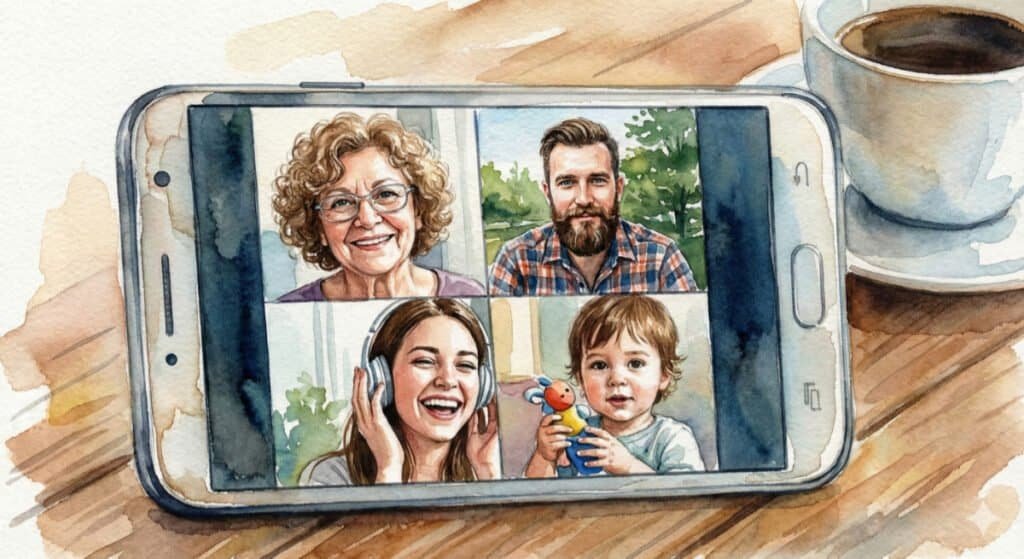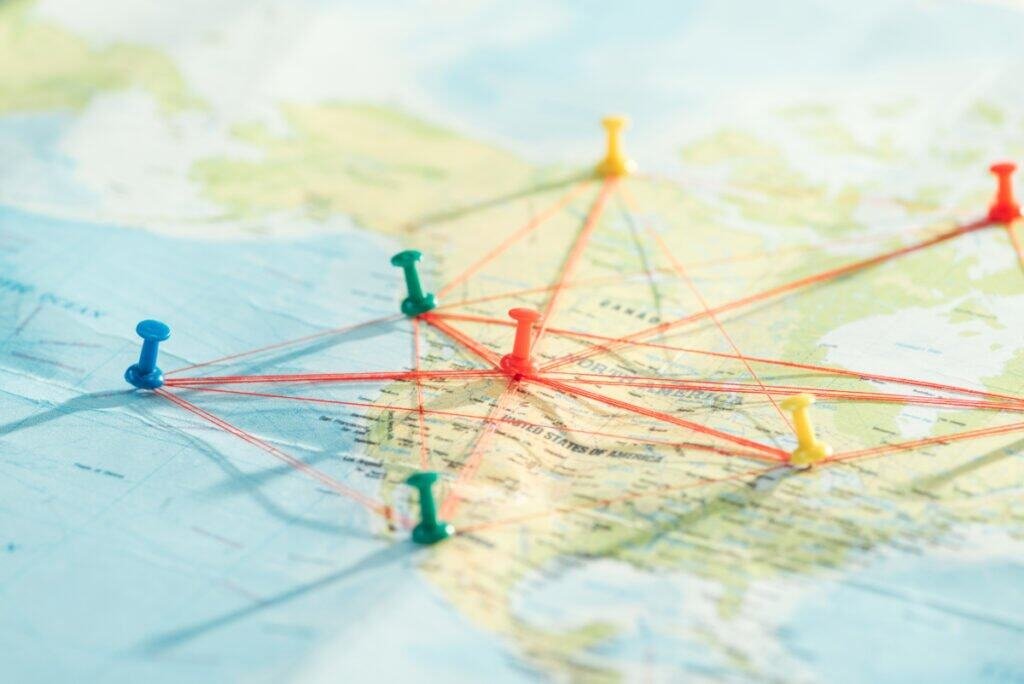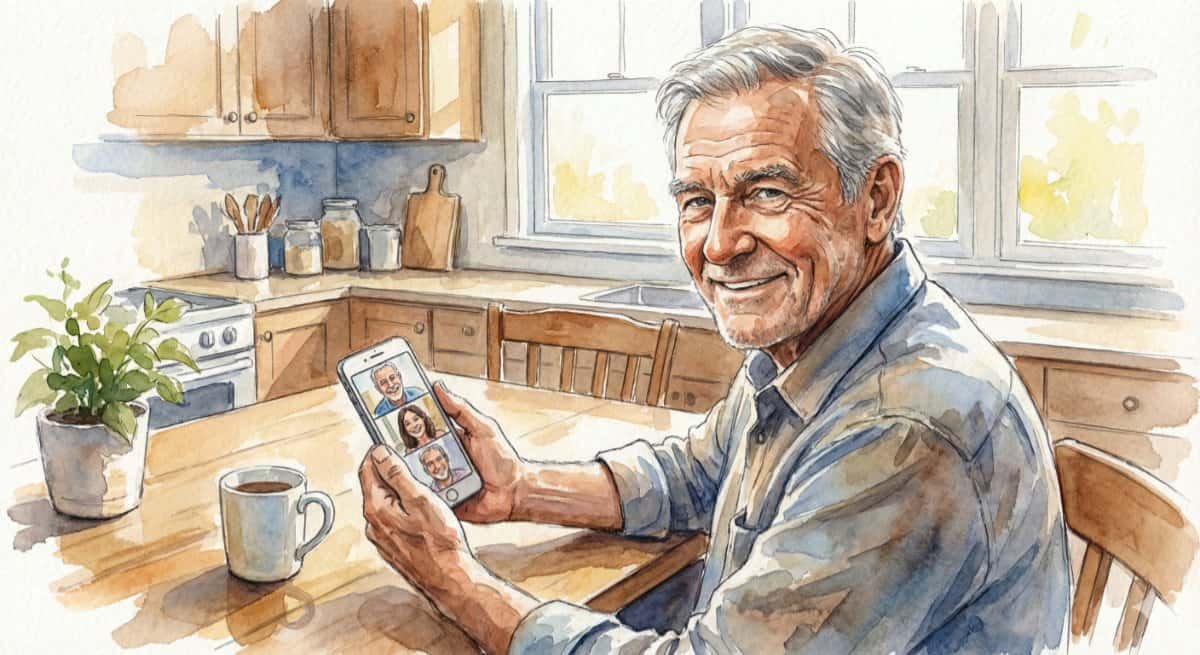Table of Contents
The Photo That Stayed With Me
A few days ago, my sister sent a photo from McDonald’s. She and my 85-year-old father sharing junk food during her visit. What should have been a cheerful family moment stayed with me in an unexpected way. I could see the weight of managing everything alone. The image reminded me of all the gradual changes I’m missing from so far away.
Living in Japan while they navigate aging in the UK, I felt that familiar weight: guilt mixed with helplessness, and love tangled with distance. But during our recent video call, the first in months, something else emerged that surprised me more than the obvious passing of time.
I realized I’m the family outsider. Not through rejection or conflict, but through fundamental differences in how we approach life itself.
Do you ever feel like you love your family but operate on a completely different frequency?
The Awkward Honesty of Video Calls
I’d planned a simple Father’s Day phone call. Instead, I impulsively hit the video button, and there we were, three people who clearly love each other but see the world through completely different lenses.
My sister, practical and protective, listing Dad’s physical limitations and realistic concerns. My father, maintained his characteristic brave front, while admitting he’s struggling more than he usually lets on. And me, unshowered on a Sunday afternoon, wrestling with spiritual obligations and practical impossibilities from 6,000 miles away.
Most people are better at playing life,” I found myself thinking. “I tend to spectate with a kind of quiet faith and more of a solitary compass.
Have you ever noticed how your family handles stress completely differently than you do?

When Love Isn’t Enough to Bridge the Gap
Here’s what struck me during that call: we care deeply about each other, but we operate from entirely different frameworks for living.
My sister approaches Dad’s situation with logical planning. Visiting schedules, fall prevention, and realistic expectations about Mum’s dementia progression. Dad handles his limitations with stoic British practicality, admitting “fathers and daughters usually have a strong bond” while downplaying his own needs.
Meanwhile, I’m sitting in Japan, wondering if I’m too comfortable and wrestling with what I “should” do versus what feels authentic, whether my values are “spiritually/selfish-based,” and how to balance my contentment here with family responsibility there.
I’ve tended to be a drifter, guided by the clearly expressed requests or needs of others.
None of us is wrong. We’re just different in outlook, in how we prioritize our view of life, in how we choose to live it.
What’s the biggest difference between how you and your family approach major decisions?

The Geography of Guilt
Living abroad while parents age creates a unique kind of torment. Every milestone that passes here, like my ex-wife’s departure, dear friends passing away, and work relationships ending, reminds me that time moves forward whether I’m paying attention or not.
That McDonald’s photo represented everything I’m missing: the gradual changes, the small daily adjustments, the reality of aging that happens in real-time rather than through occasional video calls.
My sister’s practical advice stung because it was wise: “Imagine if you decided to come here and in three months you decided you weren’t happy.” But it also revealed our different approaches. She thinks in practical scenarios, I think in spiritual obligations or a sense of mission.
How do you handle family responsibility when distance complicates everything?
Do You Ever Feel Like the Family Outsider?
Do you ever feel like you love your family but operate on a completely different frequency? Like you care deeply but can’t quite sync up with their way of moving through the world?
I’ve felt this way for years, maybe always. Not rejected, not unloved, but somehow separate. They play life; I observe it with what I can only call “quiet faith and a solitary compass.”
During our call, even my Dad admitted that fathers and daughters “usually” have strong bonds, a gentle acknowledgment that our connection, while real, doesn’t follow conventional patterns.
Are you a family member who thinks differently?

When Practicality Meets Spirituality
My impulse to uproot my life in Japan to help Dad isn’t purely altruistic. It’s tangled up with values I described as “spiritually/selfish-based”. I might regret not doing what I should have tried, even if it disrupts the contentment I’ve found here.
But my family approaches this practically: What can realistically be accomplished? What are the financial implications? What happens if plans change?
Both approaches have merit. The challenge comes from communicating with people whose decision-making process feels foreign to your own.
Do you and your family value completely different things when making life choices?
The Universal Question
After we hung up, I realized this feeling might be more common than we admit. How many of us feel like family outsiders, not through conflict or distance, but fundamental differences in how we live life?
Maybe you’re the family member who thinks too much while others act quickly. Or you prioritize emotional connection while they focus on practical solutions. Perhaps you seek meaning while they seek security, or you value authenticity while they value stability.
What makes you feel like the outsider in your own family?
The Acceptance That Comes With Age
At almost 57, I’m finally learning that being the family outsider doesn’t mean being the family failure, although I’m trying to turn my life around. It just means expressing the same love through different approaches.
My sister visits Dad regularly and manages practical concerns with competent care. Dad maintains his independence and dignity while accepting help when needed. I wrestle with spiritual obligations and geographical complications while trying to honor both my authentic life and family bonds.
We’re all doing our best with the tools we’ve chosen.
How have you learned to accept your role as the family member who’s just… different?
Finding Peace in the Difference
There’s something liberating about finally accepting that you might always be the family member who thinks differently, who navigates life with an unconventional compass.
It doesn’t mean caring less or loving differently. It means recognizing that we all have different ways of thinking.
Maybe being the outsider isn’t about becoming more like everyone else, but about showing there are different ways to express the same shared love.
What role do you play in your family? Are you the one who thinks too much, or approaches things differently? Are you an outsider?

Share your thoughts below. I respond to every comment, and your experience often helps others more than mine does.





